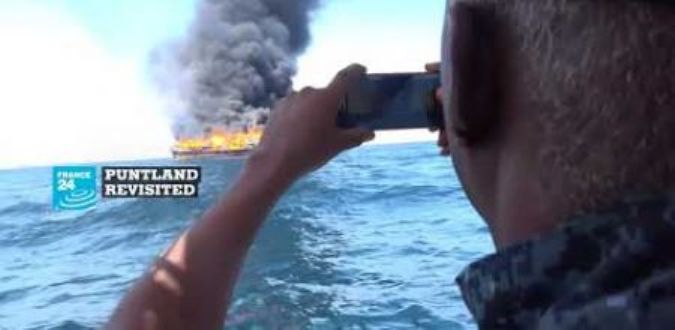A decade ago, Somali pirates were frequently in the headlines for hijacking boats and holding their crews for ransom. The epicentre of the piracy crisis was Somalia’s northeastern state of Puntland.
Local fishermen were angry at trawlers from around the world scouring the plentiful waters of the Horn of Africa. Our reporters returned to Puntland to meet its fishermen and talk to local armed forces who today face a much more dangerous threat: Al Shabaab Islamists.
Ten years ago, piracy exploded off the coast of Somalia, unleashing a media frenzy that captivated viewers around the world — playing on distant-yet-exhilarating childhood images of skulls and crossbones, walking the plank and, of course, buried treasure.
Until then, for most people, the notion of pirates was indeed one largely confined to history — and children’s books. But in 2008, 111 ships were attacked in the Gulf of Aden, which separates Somalia from Yemen and links the Indian Ocean with the Red Sea. Attacks more than doubled in 2009, a year which saw 47 successful hijackings, with a total of 263 crew members held for ransom. A staggering 154 million dollars in ransoms were paid in 2011, before concerted action by commercial ship owners and world powers brought the scourge under control.
Perhaps surprisingly, the epicentre of the piracy crisis was one of Somalia’s more internally stable regions — Puntland, which declared autonomy in 1998. One of the triggers was illegal and unregulated fishing. Local fishermen, angry that nothing was being done to confront foreign trawlers, got organised and did the jobs themselves. In holding foreign fishing crews hostage, they stumbled across an easy way to make money and, in effect, take a fat — albeit highly illegal — slice of profit from world trade, which until then had largely bypassed Somalia.
Tapping into discontent
A decade after the pirates hit the big time, our reporters Duncan Woodside and Thaïs Brouck went back to Puntland to find out what life is like there now. The pirates have nearly all been forced into retirement, their loot long since squandered. Nevertheless, our reporters found that illegal, unregulated and underreported fishing remains a big problem, despite a massive international naval presence off the coast of Somalia and the operations of Puntland’s own well-funded coastguards.
Meanwhile, the government’s authority is undermined by Al Shabaab (“The Youth” in Arabic), Islamist militants allied with Al-Qaeda, who have found sanctuary in Puntland and have been attempting to tap into discontent, amid pressure from an international military coalition in southern Somalia. To complicate the picture even further, the Islamic State group is rearing its head in the region.































